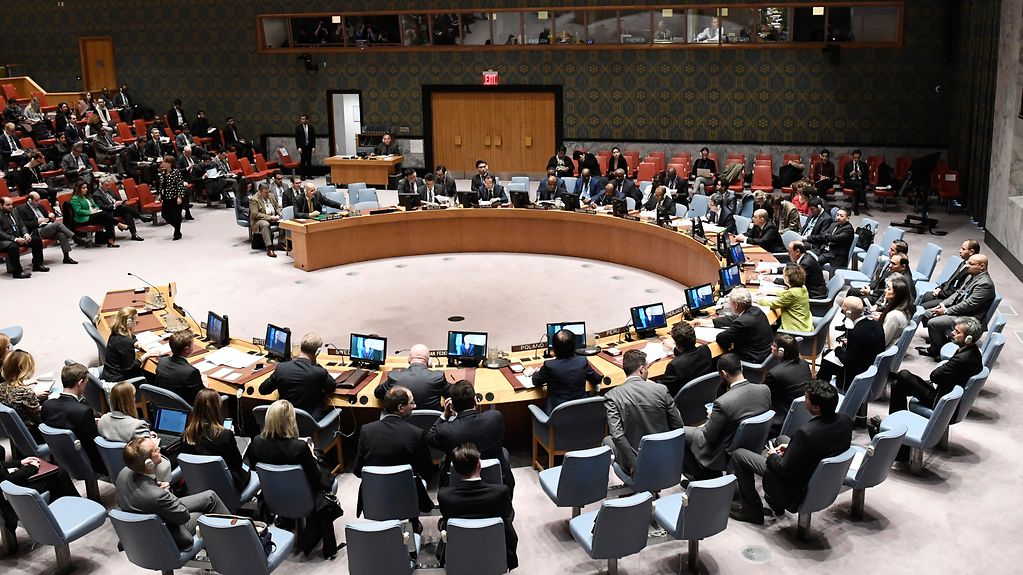United Nations
On 1 January 2019 Germany will begin a two-year membership of the United Nations Security Council for the sixth time. As a non-permanent member of the Security Council, Germany will take on a wide spectrum of duties: disarmament, crisis transformation, crisis prevention, human rights, as well as climate, security and health policy, to give but a few of the most important examples.
4 min reading time

Germany is to be a non-permanent member of the United Nations Security Council for the next two years
Photo: UN Photo/Schneider
Under the provisions of the Charter of the United Nations, the Security Council is responsible for preserving world peace and international security. Its resolutions are legally binding for all member states of the United Nations and thus for practically every country in the world.
Taking a forward-looking approach to dealing with crises, which should ideally prevent violent conflict before it happens, is one of the traditional trademarks of German UN policy on the banks of New York’s East River. Recent commemorations of the end of the First World War, the "great seminal European catastrophe of the 20thcentury" with horrendous consequences for the peoples of Europe and the world, once again make it clear how valuable conflict avoidance strategies are in a multilateral framework.
Even more than 70 years after the founding of the United Nations the world continues to suffer from wars and conflict, but extensive crisis and mediation mechanisms have managed to stem or even prevent conflicts.
Germany in the United Nations
Germany has been a member of the United Nations since 1973 – the Federal Republic of Germany and the German Democratic Republic (GDR) were both admitted on 18 September 1973. After German reunification in1990, the reputation, responsibility and status of Germany continued to grow within the United Nations.
Germany is represented on numerous bodies, organisations and facilities, where it works for cooperative multilateralism. Germany is also involved in United Nations peace missions regularly. The most important missions involving German soldiers or police officers are as follows:
- UNIFIL (Lebanon)
- MINURSO (Western Sahara)
- MINUSMA (Mali)
- UNMISS (South Sudan)
- UNAMID (Sudan)
- UNSMIL (Libya)
- UNSOM (Somalia)
- MINUJUSTH (Haiti)
In addition, Germany is involved in other missions to which it seconds civilian personnel. United Nations peace missions increasingly focus on conflicts within one country and are thus what is termed "multidimensional assignments".
These missions do not involve purely military activities to establish peace, such as securing borders, monitoring and protecting civilians, but also comprise a wide spectrum of civilian duties. Depending on their mandate, the peace missions support political processes such as efforts to mediate between parties to the conflict, as seen in Darfur and Mali. They provide assistance with security sector reform, the destruction of small arms, monitoring elections and democratic processes, building rule-of-law institutions and monitoring the human rights situation.
Fourth largest contributor
In addition to contributing personnel to the peace missions, Germany supports this comprehensive engagement of the United Nations in many places with flanking stabilisation measures, and endeavours to support peacekeeping, for instance with training measures for which mobile training teams are deployed.
The two-year budget of the United Nations for 2018/2019 totalled almost 5.4 billion US dollars. Germany provides 6.4 per cent of this sum per year. This makes Germany the fourth largest contributor to the regular budget after the USA (22 per cent), Japan (9.7 per cent) and China (7.9 per cent). The 28 member states of the European Union together provide about 31 per cent of the budget of the United Nations.
For reform of the United Nations Security Council
The German government has been working for years to reform the United Nations Security Council, in order to give this key body in preserving world peace additional legitimacy and authority. Today’s multipolar world and the main contributors to the United Nations no longer sufficiently reflected by the permanent members of the United Nations Security Council (USA, Russia, China, United Kingdom and France), as was the case when the United Nations was founded in 1945.
Germany, Brazil, India and Japan are coordinating their reform efforts closely, in order to strengthen the ability of the United Nations and its Security Council to continue to act in the 21stcentury.
Current crises and conflicts that bring with them immense human suffering, such as the war in Yemen, the continuing conflicts in Sudan/South Sudan, Somalia, the Saharan states and the still dangerous situation in the Middle East are only some of the issues that the Security Council will be called on to address.
Priorities of Germany’s UN policy
The German government also intends to keep the following priorities in view:
- Protecting women and getting them involved in peace processes to ensure sustainable peace keeping
- Taking greater account of climate change as a catalyst of crises within the framework of the Group of Friends on Climate and Security initiated by Germany and others in 2011.
- The need to strengthen peacekeeping as a multilateral conflict resolution instrument with feasible mandates, such that the transition from peacekeeping to peacebuilding is made easier as a political process.
To realise these ambitious goals, Germany needs allies and fellow campaigners – particularly among our European friends within the Security Council. EU coherence is a very important concern of the German government – in New York as elsewhere.